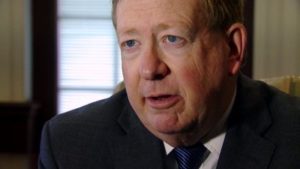 Six-term incumbent Carmel mayor Jim Brainard faced off against his primary challenger, Hamilton County Councilor Fred Glynn in a mayoral debate held at the Ritz Charles on Tuesday evening, April 15th. Both candidates are to be commended for agreeing to this debate and giving Carmel’s voters a glimpse into their respective visions for the city, as well as to answer questions about issues of concern to voters.
Six-term incumbent Carmel mayor Jim Brainard faced off against his primary challenger, Hamilton County Councilor Fred Glynn in a mayoral debate held at the Ritz Charles on Tuesday evening, April 15th. Both candidates are to be commended for agreeing to this debate and giving Carmel’s voters a glimpse into their respective visions for the city, as well as to answer questions about issues of concern to voters.
Yet, it didn’t take Brainard long at all to resort to making misleading statements in an effort to build his case for yet another term. In his opening remarks alone, the mayor said the following that fact-checking shows as rather significant misrepresentations:

“..in fact, a house paying $3000 in taxes in 1998 today is only paying about $2100.”
Brainard is only able to say this because Indiana’s property tax reform of 2008 and subsequent constitutional ratification of property tax caps by Indiana voters in 2010 created mandated tax cuts and”circuit breaker” ad valorem rate caps. As a result, the amount of assessed value that can be taxed is substantially less today than prior to tax reform. This example citied by the mayor has little or no relevance to any action taken by him or his administration during his over two decades in office.
 “…we ended 2018 with a $56 million of operating reserves.”
“…we ended 2018 with a $56 million of operating reserves.”
During his time in office, it has been common practice for Jim Brainard to have year-end debt-service payments withheld until after January 1st of the new year, so that he can point to large year-end balances in city operational accounts and claim them as “reserves” and examples of “prudent management” of public funds. The reality is that, once the debt service and other payments due at years-end are made just after the new year starts, city balances dip precariously low until tax revenues begin to replenish city coffers.
“…our bond rating, it’s gone up and down a little. It’s AA when I started as mayor, went up to AA+, it’s at AA now.”
Brainard conveniently sidesteps the reasons for the most recent downgrade of the city’s bond rating by Standard & Poors, a move made by the firm as a result of concerns that annual debt payments will grow 71% by 2022, even as the city continued to borrow more money in the wake of the downgrade. Moreover, S&P was highly concerned about the city of Carmel having to money between funds in 2015 to pay a portion of debt service. In their letter to the city, S&P wrote “In our view, this demonstrates the risk of high leverage and a heavy dependence on sometimes more volatile tax-increment revenues. We feel the city’s crowded budget and high fixed costs leave it vulnerable to unanticipated economic or operational swings.”
 “…I can guarantee you, in the next 10 years, no tax increases — probably out to 20.”
“…I can guarantee you, in the next 10 years, no tax increases — probably out to 20.”
This promise, made with august bravado, defies Brainard’s own checkered history with significant increases to property taxes during his 24 years in office. One only needs to look to 2008 (+14%), 2009 (+24.5%), 2012 (+1.9%), 2013 (+3.2%), 2016 (+16.2%) for examples of rather significant tax rate hikes. As he prepared to run for a 7th term in 2019, the mayor and his council majority engineered net reductions in the 2018 (-5.7%) and 2019 (-0.01%) rates to give Carmel taxpayers a false sense of frugality at City Hall, even as non-essential operational expenses and maintenance were deferred in order to reduce expenses and give political cover to the incumbents until after the current election cycle completes.
This, when combined with the net effects of property tax caps that are estimated to result in over $4.8 million in lost tax revenue in 2019, suggests a rather sobering scenario where another significant increase in the city property tax rate for 2020 will be necessary in order to cover increased operational expenses and increasing debt-service obligations.
What Jim Brainard and council incumbents really hope you don’t find out is how the city of Carmel is under a 2019 budget order from the Indiana Department of Local Government Finance that forced budget decreases in Motor Vehicle Highway (MVH), Cumulative Capital Improvement (CCI), Cumulative Capital Development (CCD) and redevelopment bonds because projected revenues were insufficient to cover the proposed budgeted expenses.
Jim Brainard will say and do anything to get elected. Anything. Truth is but a secondary concern to him and his supporters. Ask yourself why he would be so motivated to bend or outright evade the truth.
Then, cast an informed vote on May 7th.

brought to you by our friends at Essayists of Carmel, Indiana

